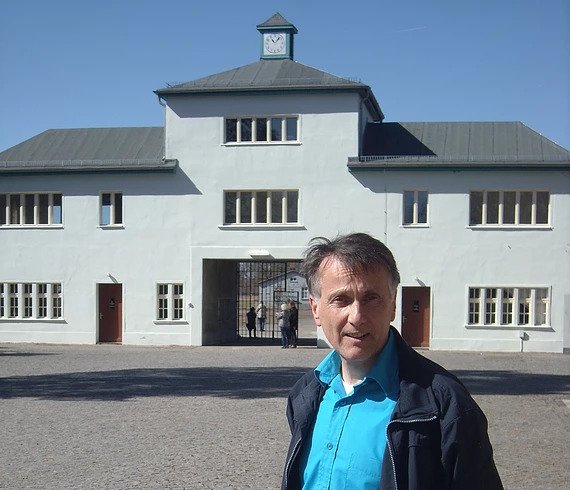
I learned a new term yesterday: the ‘Dachau School’. You might be able to guess what it means – I did, and I was right. Unfortunately.
I’ve actually just had a double-dose of exposure to the brutality human beings are capable of inflicting on fellow human beings. Yesterday I visited Sachsenhausen (picture), the former Nazi concentration camp just north of Berlin where my grandfather spent 12 days in November 1938 before my grandmother got him out with something of a bluff. And today I visited Hohenschönhausen, the Stasi interrogation centre of the former East Germany, which to all intents and purposes was a communist concentration camp.
At one level we’re all confronted daily with human-on-human violence and barbarity. We get inured to names like Aleppo, Ghouta and other towns that recur in our nightly news bulletins carrying stories of atrocities we half tune-out from. Even now, how many people are truly aware of the horrors committed in Rwanda and Bosnia in the mid-1990s. Indeed how many people stop and think of the horrors of the 50 people murdered in London in just over three months of the year? It may be a survival reflex – the need to switch off from appalling news so it doesn’t drag us down – but we must never lose our horror at such acts of brutality, and what we might do to prevent them.
I had been meaning to go to Sachsenhausen for years. When I was young, my German grandmother told me how she had gone to the commandant and told him her husband had been wrongly imprisoned there. She told him to phone the lieutenant with whom my grandfather had served in the first world war for confirmation. Whether the commandant ever did we’ll never know (I suspect he didn’t based on what I found out yesterday), but the bluff served two purposes: she got confirmation that he was actually in Sachsenhausen, and he was released the following day.
I therefore wanted to find out a bit about the commandant to whom my grandmother spoke. His name was Hermann Baranowski, and he served in the Kaiser’s navy in the first world war. That may have given him a sense of solidarity with my grandfather, but what I also learned was that Baranowski was a disciple of the ‘Dachau School’. This was a form of training carried out by the Dachau camp commandant Theodor Eicke in which he dehumanised other commandants. Many leading Nazi officers were happy to support the Nazi ideology but ordering the mass murder of people on racial grounds was a step too far – Eicke’s ‘school’ made sure that any such scruples were wiped out.
What I learned was that the influx of prisoners that followed Kristallnacht (9 November 1938; my grandfather was taken to Sachsenhausen the following morning) was too large for the camp to handle, so there emerged a policy that they were gradually released on condition that they tried to emigrate. Therefore, my grandmother was knocking at an open door. My grandfather was released on 22 November, and most of Sachsenhausen’s November intake was out by January. But it sounds like he got out just in time, for Baranowski started practising his Dachau School training in early 1939. By then my father had made it to England, and his parents followed shortly after.
This was my second visit to a concentration camp. My first was in 1982 to Theresienstadt (now Terezin in the Czech Republic). That was harrowing because it was filled with children whose parents had been sent to Auschwitz – there were lot of paintings by these children before they were gassed, some with premonitions. Sachsenhausen was harrowing because it involved a member of my family (other family members were not so lucky; some of my great-aunts and great-uncles perished in concentration camps in 1942-43). And Hohenschönhausen was harrowing because it was both recent and psychologically harsher than the Nazi camps. The common factor in all three was the brutality people inflicted on other people.
How an individual can inflict such suffering on another individual is no doubt a question for the psychologists and neurologists, but one of the reasons it can happen is because the rest of the world turns a blind eye. At Sachsenhausen there are displays of how the camp was used to show prominent visitors from around the world Germany’s wonderfully efficient and humane penal system. As I read the reports and newspaper cuttings from Sachsenhausen’s visitors in the 1930s, I thought, ‘This is what people wanted to believe, this is what fitted with their own personal view of the world. And that’s how it could happen, and thrive.’
We should remember that today. We should remember it especially when we accept the lies of Donald Trump, or the Brexit campaign, or the anti-foreigner parties of Italy, the Netherlands, Hungary, and even France and Germany. It’s relevant to the current UK-Russia diplomatic stand-off following the Salisbury nerve agent attack (though I take no side on that in this column). If we have a hunch about something, we should investigate, for failure to do so means we could be just as much accessories to the meting out of human-on-human brutality as the people of Sachsenhausen, Hohenschönhausen and other notorious places.
